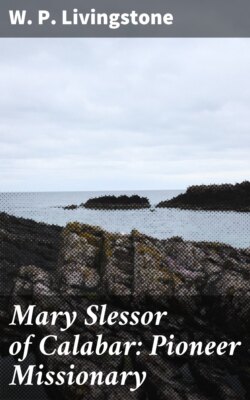Читать книгу Mary Slessor of Calabar: Pioneer Missionary - W. P. Livingstone - Страница 18
На сайте Литреса книга снята с продажи.
IV. THE PULL OF HOME
ОглавлениеTable of Contents
It was not long before she had to revise her opinion of the climate. Nature was beautiful, but beneath its fair appearance lurked influences that were cruel and pitiless. "Calabar needs a brave heart and a stout body," she wrote; "not that I have very much of the former, but I have felt the need for it often when sick and lonely." Both the dry and rainy seasons had their drawbacks, but she especially disliked the former-which lasted from December to March-because of the "smokes" or harmattan, a haze composed of fine dust blown from the great African desert, that withered her up and sucked out all the energy she possessed. She was frequently attacked by fever, and laid aside, and on one occasion was at the point of death. But she never lost her confidence in God. Once she thought she had. It was during an illness when she was only semi-conscious, but on recovering the clearness of her mind she realised that she had given herself into His keeping and need not fear, and a sense of comfort and peace stole over her. So many attacks weakened her constitution and made her think oftener of home. She began to have a longing to look again upon loved faces, to have grey skies overhead, and to feel the tang of the clean cool air on her cheek, "I want my home and my mother," she confessed. It was home- sickness, and there is only one cure for that. It comes, however, to pass. It is not so overpowering after the first home-going, and it grows less importunate after each visit. One finds after a short absence that things in the old environment are, somehow, not the same; that there has ceased to be a niche which one can fill; that one has a fresh point of view; and as time goes on and the roots of life go deeper into the soil of the new country, the realisation comes that it is in the homeland where one is homeless, and in the land of exile where one is at home. But at first the pull of the old associations is irresistible; and so when her furlough was due, Mary flew to Scotland as a wandered bird flies wing-weary back to its nest.
She left Calabar in June 1879 and proceeded straight to Dundee. During her stay she removed her mother and sisters to Downfield, a village on the outskirts of the city, and was happy in the knowledge that all was well with them. Friends who listened to her graphic account of Calabar tell that even then she spoke of her desire to go up country into the unworked fields, and especially to the Okoyong district, but "Daddy" Anderson was opposed to the idea. Before returning, she wrote the Foreign Mission Committee and begged to be sent to a station other than Duke Town, though she loyally added that she would do whatever was thought best. She sailed with the Rev. Hugh Goldie, one of the veteran pioneers of the Mission, and Mrs. Goldie, and on arrival at Calabar, in October 1880, found to her joy that she was to be in charge of Old Town, and that she was a real missionary at last.
